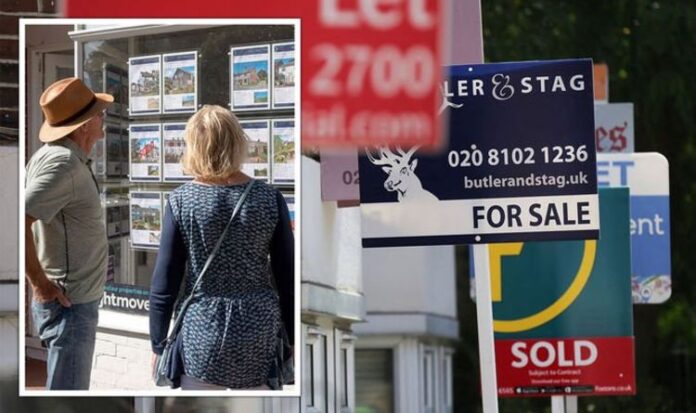House prices have fallen across the board for the third consecutive quarter in 2021. The most significant decline of the year has hit almost every type of dwelling, unsettling market backers. Buyers looking for a new home may believe now is their moment to strike, but the data shows now is the time for caution.
Is it the right time to buy a new home?
Every category analysed by the ONS found a gradual house price decline that came to a head in the latest quarterly update.
The department analysed average prices of “new dwellings”, “other dwellings”, “all dwellings”, “first-time buyers”, and “former owner-occupiers” for the UK as a whole.
Of those five, results showed other dwellings fell the most in the third quarter (July, August and September) at around £50,000 since the second (April, May and June), followed by all dwellings and former owner-occupiers at £48,000 each.
READ MORE: Rightmove predicts 5% house price rise
New dwellings and first-time buyers had the lowest decline, at £30,000 and £32,000 respectively.
The average new dwelling price is now £298,000, the lowest since 2017 when first quarter (January, February and March) data showed average prices had settled at £291,000.
Although the price drop is more gentle than the others, people looking for their first home are getting the lowest prices across the board.
In the first quarter, they could purchase a house for an average of £257,000.
That average is now £224,000, the lowest since the second quarter of 2020 when prices averaged at £220,000.
But the ONS data doesn’t mean that now is the right time to invest in a new home or buy one for the first time.
With prices, the average income for new home buyers has hit an annual low, as have their potential advances.
UK-based new dwelling buyers have an income of roughly £62,000, down from £66,000 between April and June, while they will only receive an average advance of £198,000.
DON’T MISS
The ONS has found lenders are willing to give £30,000 less to people in recent months, as the average second-quarter advance was £328,000.
The same goes for first-time buyers, who have also seen their incomes and advances drop.
Much like house prices among their category, they are at the lowest across the board.
The average first-time buyer now commands roughly £50,000, meaning their income has depreciated £5,000 compared to the last quarter.
And they will likely need to use more than the equivalent of their annual salary to add to advances.
The average advance for a first-time buyer is now £172,000, £52,000 less than the £224,000 they need for a home.
The amount they pay will also depend on where they live, as those in the city need to fork over considerably more.
While the national average is £224,000 for first-timers, in London, it is £449,000, where lenders offer roughly £309,000.
The data for 2021 is not complete yet, as the ONS is still awaiting fourth-quarter results, covering October, November and December.
These will come out on February 16, 2022, and will show how buyers have behaved this year.
House prices tend to go up with high demand and low supply, and the latest results could encourage people to buy new homes.
A surge in interest and subsequent reduction in available homes could see fourth-quarter results differ from the rest of the year, potentially growing.
Credit: Source link










